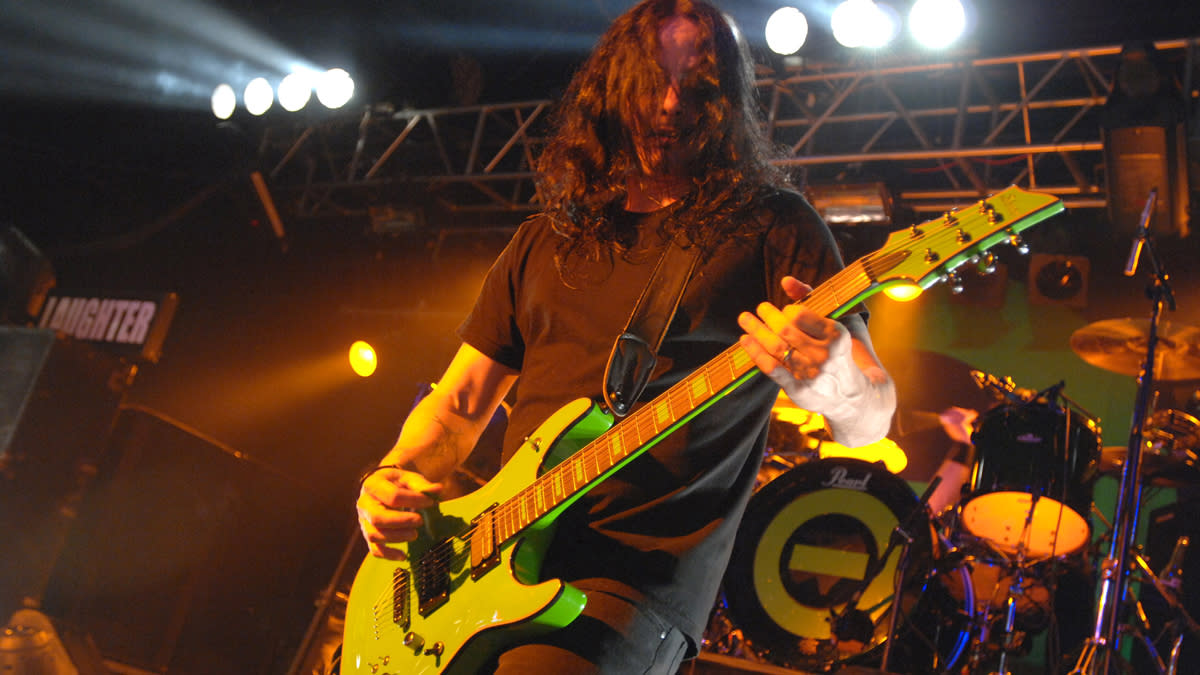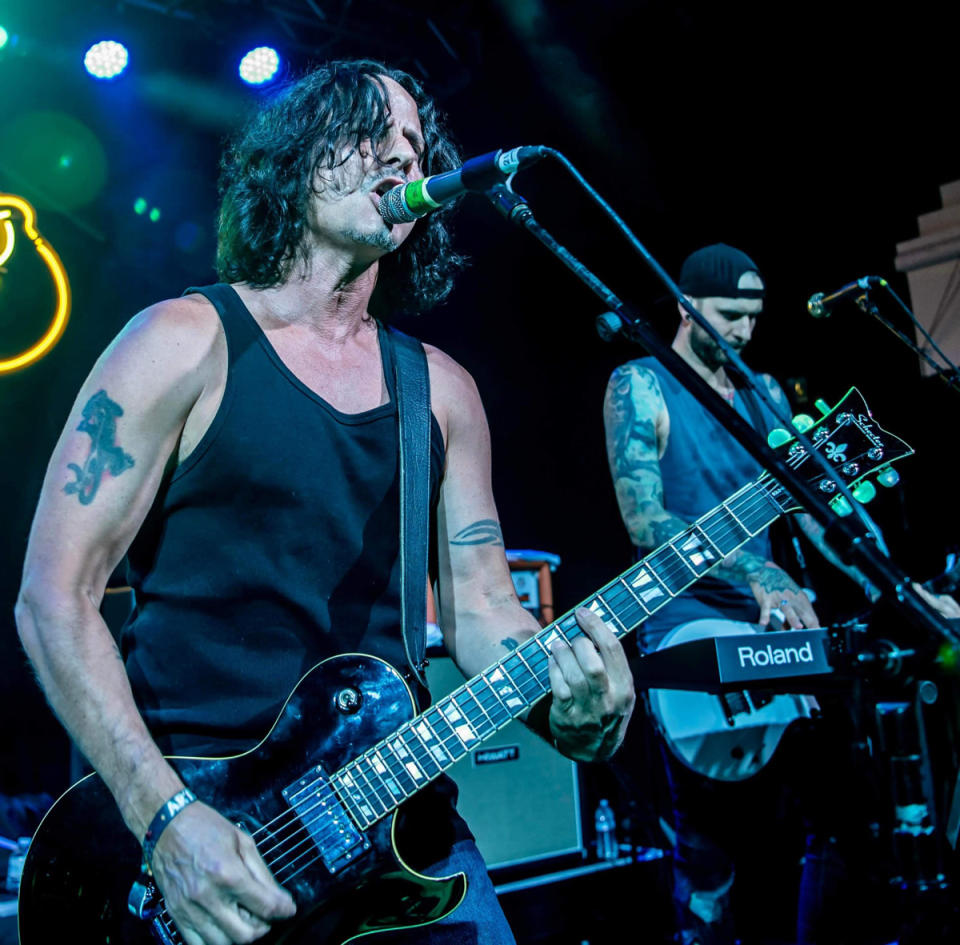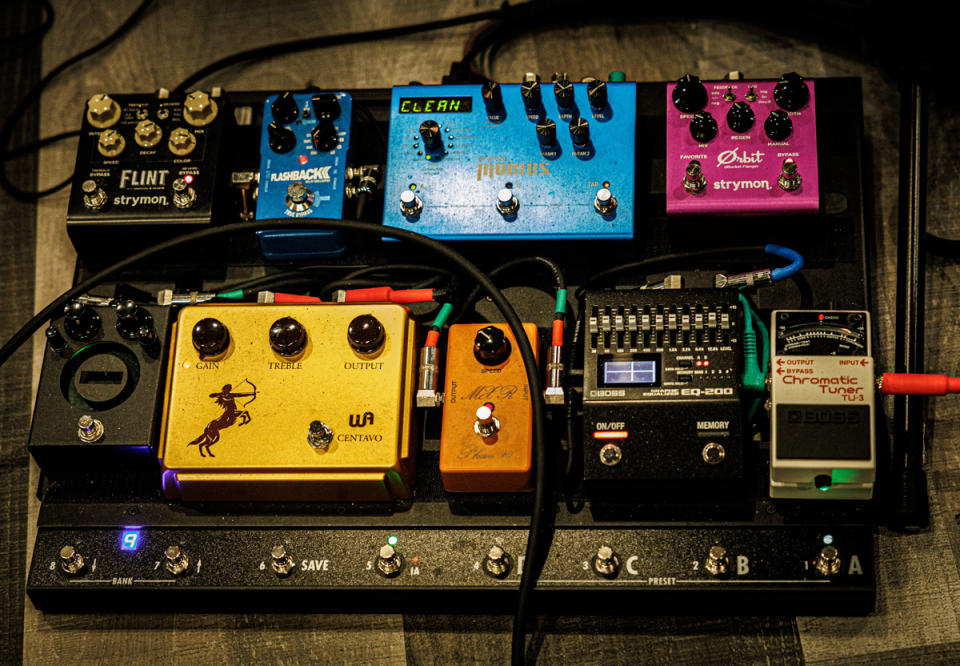“All of Ace Frehley’s leads are memorable. Even though he’s not a shredder, he’s catchy, filled with melody, and exactly what a lead guitarist should be”: Type O Negative’s Kenny Hickey on how Kiss inspired his gothic metal masterpieces

- Oops!Something went wrong.Please try again later.
- Oops!Something went wrong.Please try again later.
As far as gothic metal goes, the buck stops at Type O Negative’s lawless, atmospheric imagery that haunts the nightmares of the group's devotees.
Typo O Negative was a breath of fresh air filled with new, exciting, and darkly alternative sounds. And it was driven by the brooding figure of Kenny Hickey, a guitarist more concerned with tuning down than posturing in front of big-ass amps.
Given his predisposition to write riffs that plumb the depths of his darkest hours, you might assume that Hickey's inspiration came from The Cure, Killing Joke, or Echo & the Bunnymen. But no, Hickey's muse as a young player was decidedly glam: Ace Frehley.
"I wasn't influenced by Ace in terms of sound," Hickey says, "It was more about phrasing. I grew up seeing Ace do what he did with a smoking guitar while playing Madison Square Garden, which blew my mind. He’s like the lead guitar archetype."
"The strength in Ace's phrasing is unreal – all his leads are memorable. I can sing every one of them to this day, which rubbed off on me. It's still in me, even with the leads I'm doing today. And I love his ripping stuff; even though he's not a shredder, he's catchy, filled with melody, and exactly what a lead guitarist should be."
Kabuki-clad heroes aside, Hickey provided a form of guitar heroics in an era where predisposed notions on what a “hero” were had been kicked to the curb. Still, it took a couple of albums to get his feet wet. But Type O Negative's third record, Bloody Kisses (1993), chugged into the station with vigor.
Looking back, Hickey says, “I think Bloody Kisses is probably the definitive album as far as guitar," he says. "But I also like my work on World Coming Down and Dead Again. I'm proud of them all; they all stand up."
30 years later, Bloody Kisses remains beloved. And with good reason: the songs have aged well, and the riffs, solos, and arrangements more than hold up. As for Hickey, sure, he's proud, but far from beholden.
"I hope that I've gotten better as I've gone along," Hickey says. "You always want to get better and not worse, right? But now, I'm efficient in the studio, which was harder during Bloody Kisses because I was learning. There were no clicks back then – nobody played that way. It was all rehearsal before recording, and I'm glad I did because it made me more efficient.
"As far as tone goes," he continues, "that's something I'm always chasing. Aren't all of us guitarists doing that? I've learned to incorporate chorus and delay better, and I'd like to do a signature pedal with both. I’ll always be looking to refine and make everything I do better."
Tell me about your latest project, EYE AM.
"It formed with Johnny Kelly [drums], Kirk Windstein [vocals], Todd Strange [bass], and me. It came to be about six or seven months ago when our mutual friend started this little label [Corpse Paint Records] and said, 'I'd love to see you guys get together and come down to the studio.' We did a single about five months ago called Dreams Always Die with the Sun, and it did so fucking well. So, we hit the studio in New Orleans, doing a few more songs, and we've got music coming out in November."
What does your riff writing process look like these days?
"It's a lot of off-the-cuff stuff. I'll go into my iPhone, where thousands of voice memos are, and randomly pick. What I've been doing for years is adding any idea that comes to me as they come to me. And when I need a riff, I'll see if there's anything I can build on. Beyond that, it's a matter of throwing riff ideas around, developing them on the spot, and seeing if anything comes."
What are a few things you look for while digging around in your iPhone riff vault?
"There's a lot of riffs in there, and a lot of them are shit [laughs]. Some of them don't make sense, and I'll go, 'Oh, wow, what the hell was I thinking?' But a ton in there are awesome and stick out immediately. But even with that, I’ll check myself and say, 'Okay… is this a riff I've used already?' But I'll look for good chord progressions, things I feel I can build on. Thank God for the technology of having a smartphone!"
Do you apply that same mindset when writing solos?
"No, solos are a little different. Usually, I write the best solos in my studio, and I have the chance to improvise and play with things a million times. In doing that, I'll get a hold of a little phrase that can be catchy and cool, and I'll run with that. And then, I'll build on that phrase; from there, it's more improvisation. I may do five or six passes on a solo, then pick my favorite parts and refine them as far as tempo, phrasing, and voicing."

How did you develop your signature Schecter, the C-Q EX?
"It was more about practical usage than anything else. With that, the force is very low when tuning down, which is great because it's not even a seven-string. The other thing is that it's a baritone guitar, which makes the harmonics work better. I always run into issues with the guitar being too damn bassy, especially with [EMG] active pickups. There was too much fucking bass; I wanted to filter that low-end out and clean it up."
How did you do that?
"With my guitar, it cuts through all that and condenses everything. My struggle has always been to get a guitar that's tuned down heavy and low but doesn't have all the mud. So, it kinda sounds like a fucking Les Paul, but tuned down. It's got a mahogany body, maple neck, a Sustainiac pickup in the neck, and a Seymour Duncan that's more like a PAF in the bridge. It doesn't have all that low-end; all that has been filtered out. It's better than putting a Tube Screamer or a distortion in front of it to filter the lows out."

And how does your signature chorus pedal with Jessup Amps fit into the equation?
"That was about two years in the making. They sent me some things to check out. And they had made a bunch of small-batch pedals, but maybe only one chorus. So, they said they'd like to do a signature chorus with me, which I was into. But it was important to me to have a clean, beautiful sound, like an analog chorus that works well with distorted sounds.
"So, its circuitry is mixed, like a parallel mixer, allowing it to blend those sounds better. It's warmer, more analog, and eliminates the fizzy crap that often comes through. I'd compare it to a souped-up version of the old Boss Chorus [CE-2]. We only made 50 of them, and they sold out in two hours, but they're working on another batch now."
It's been 30 years since the release of Type O Negative's Bloody Kisses. What gear defined that record?
"Since it was in the early-'90s, I would have had a huge rack system. So, I had the rack system going, which, believe it or not, was an old A/DA. This was before they made the noisy shit; it was one of the earlier ones they made. And I had a [Fender] Quad Reverb, a product of me trying things out to figure out what worked. As far as guitars, I was playing Gibson stuff, so I woulda had a few SGs."
Was there anything on your pedalboard that remains today?
"I had a Boss Chorus [CE-2], but I have my signature chorus, so I'm not using the Boss now, but I still have it. And, like I said, the new pedal is modeled after the Boss, so the spirit remains. And I had my Ibanez Tube Screamer [TS-9], which I used when doing tuned-down stuff, so I'd throw that in front to filter out the lows. I woulda had that, and I still have it now, but with the new guitar, I don't need it like I used to."
What does Bloody Kisses mean to you in retrospect?
"It means a lot, man. It's very nostalgic for me. Musicians – and maybe more so guitarists – have this thing where they look back, hear certain songs, and take you back to certain places based on whatever effects, amps, and guitars you were using at the time. I look back on Bloody Kisses, and I feel all of that. I get a good feeling that's still connected deeply to my heart, you know?
"That album connects with me deeply because I played on it, so I'm affected. But now, I can also look at it almost like a fan, which I couldn't do when I was still close to it. I love the alternative guitar sounds on Black No. 1 (Little Miss Scare-All), and the 12-string on Christian Woman is fucking awesome. And there's ambient stuff, which equated to some dream-like moments on guitar. That's what turned me on most then and still does now."

